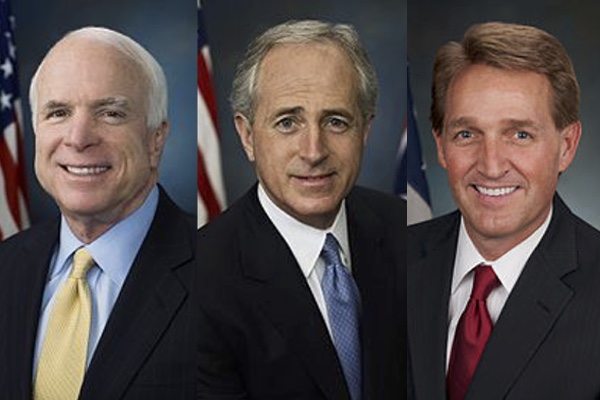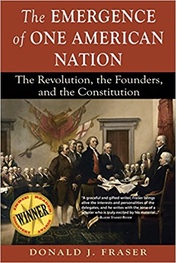How Come There Aren’t More Republicans Showing Guts?

Senators McCain, Corker and Flake
It doesn’t look like there will be any Profiles in Courage awards for the modern Republican Party. While a few noted Republicans, including John McCain (a former winner), Bob Corker, and Jeff Flake have taken courageous stands against President Donald Trump, most in the party seems to have capitulated to Trumpism. The President was recently welcomed on Capitol Hill “with two standing ovations. Actually three,” as Senator John Kennedy (R-LA) noted. How ironic coming from the man with same name as the 35th president.
 The
Profiles in Courage awards are given to politicians who do what they
think is right, even if it is politically unpopular. The award is
named for the 1957 Pulitzer prize-winning book by then Senator John
F. Kennedy. “The book is about eight U.S. Senators who took a vote
against the wishes of their constituents and in some cases, gave up
their careers for the national interest,” Kennedy noted. The award
was created in 1989 by members of the Kennedy family. Past high
profile Republican winners included McCain for campaign finance
reform, George H.W. Bush for increasing taxes in order to reduce the
budget deficit, and Gerald Ford for pardoning Richard Nixon. Each of
these actions were unpopular but later proved to be the correct
policy. In the case of both Ford and Bush, it may have also cost them
a presidential election.
The
Profiles in Courage awards are given to politicians who do what they
think is right, even if it is politically unpopular. The award is
named for the 1957 Pulitzer prize-winning book by then Senator John
F. Kennedy. “The book is about eight U.S. Senators who took a vote
against the wishes of their constituents and in some cases, gave up
their careers for the national interest,” Kennedy noted. The award
was created in 1989 by members of the Kennedy family. Past high
profile Republican winners included McCain for campaign finance
reform, George H.W. Bush for increasing taxes in order to reduce the
budget deficit, and Gerald Ford for pardoning Richard Nixon. Each of
these actions were unpopular but later proved to be the correct
policy. In the case of both Ford and Bush, it may have also cost them
a presidential election.
The question the Republican Party needs to face is: does Trump’s authoritarian brand of protectionism, economic nationalism, and scapegoating of certain Americans, with its pitch to white nationalists, really represent a party that was born in the struggle against slavery and which has historically favored internationalism, free trade, and individual opportunity? The obvious answer is no. Speaker of the House Paul Ryan seemed to believe this as recently as July when he said,” “White supremacy is repulsive. This bigotry is counter to all this country stands for.” Yet Ryan, on the same issue of race relations said in October that he believed that Trump’s “heart is in the right place.” Mitch McConnel, who has come under criticism from the president, also seems to have fallen in line with the fearless leader. Why? Because Trump has the support of rank and file Republican voters. A recent Fox New poll shows that 83 percent of rank and file Republicans support the president, even though his overall approval rating is only 30 percent. But the unpopularity of a cause is not sufficient reason to abandon it. The definition of political courage, according to Kennedy, is to do what is right in the face of opposition, especially from one’s core supporters. The role of leadership should be to inform and educate the public about the danger that Donald Trump represents to our republic. Perhaps some rank and file Republicans, especially those in competitive congressional districts, are reconsidering their support for the president in the aftermath of the elections results on November 7, 2017.
The leaders of the GOP should take a page from our Founding Fathers. During the 1780’s under the government established by the Articles of Confederation, problems continued to mount to the point where an atmosphere of crisis had settled in among some in the elite. John Quincy Adams, in a speech to his fellow graduates of Harvard in 1787, called it the “critical period when the country was groaning under the intolerable burden of … accumulated evils.” Yet, despite the problems that existed and the lack of unity, the weak government under the Articles was popular with the public. Historians with differing perspectives agree on this. John Ferling writes: “No evidence existed of widespread popular sentiment on behalf of altering the Articles of Confederation and strengthening the national government.” Jack Rakove writes that “few American leaders believed that the new nation was actually poised on the brink of a crisis” and that “most Americans showed little interest in public affairs.” And Joseph Ellis opined that “the very weakness of the federal government under the Articles of Confederation [was] the ideal expression of revolutionary intentions.”
In the absence of the unity enforced by the war, with little public support for a stronger central government, little held the country together in the 1780s; citizens had no sense of national unity or identity, and there was much to split the new country apart. While we can’t know what might have happened in the absence of the Constitution, people at the time, including James Madison, thought that the states would split into “two or more Confederacies.” The question is, Why didn’t this happen? How did the United States choose a different path than disintegration, one that resulted in a wholly new structure of government framed at the Constitutional Convention held in Philadelphia in 1787?
The answer is leadership. Joseph Ellis makes the case that “a tiny minority of prominent political leaders from several key states conspired to draft and then ratify a document designed to accommodate republican principles to a national scale.” The main characters in this drama were George Washington, James Madison and Alexander Hamilton. Without their leadership, and despite the unpopularity of their cause, it is hard to see how the United States could have grown into the one nation we eventually became. Had the Profiles in Courage award existed at our founding, the leaders of the nationalist movement would be considered worthy recipients of the award.
Senators Corker, Flake and McCain have, each in their own way, indicated that Trump is fundamentally unfit to be president. Perhaps they should heed the advice of Republican Steve Schmidt, who has made the case that the three senators should make Maine’s independent Senator Angus King the majority leader in order to provide greater oversight over Trump and his administration. This could ultimately lead to a new coalition with a less partisan edge, drawn together not on issues but rather based on a common commitment to democratic norms, basic decency in the public square, and the highest ideals of our nation. Leading such a coalition could even win the three senators a Profiles in Courage award.